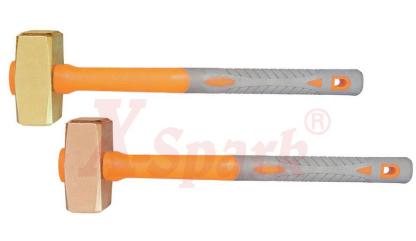If you are a professional working in the field of oil and gas, then you will know that it is important for you to choose a specific hand tool that can minimize the risk of accidents in the workplace. For Facom, worker safety is of utmost importance, and Hebei Botou Safety Tools Group is committed to designing a reliable catalog of non-sparking and explosion-proof hand tools to ensure worker safety. Hebei Botou Safety Tools Group's non-sparking hand tools series are designed to meet the explosive needs of ATEX areas (such as oil refineries, offshore oil rigs, coal mines, etc.). If you choose Hebei Botou Safety Tools Group hammer, and non-sparking wrench, you can rely on the brand's experience and expertise, and ensure that these detail-oriented tools can ensure your maximum work safety.
What is a non-sparking tool?
Non-Sparking Safety Tools or explosion-proof tools are very different from the conventional manual tools commonly used in toolboxes of mechanical workshop professionals. In fact, conventional hand tools are usually made of high-strength chrome-vanadium steel alloy, which is not suitable for use in equipment that may have an explosive environment (such as oil rigs): in fact, if the steel wrench will fall in this way In the environment, sparks may be generated, which may cause an explosion or fire, thereby endangering the lives of all workers on the platform.
This is why you need special tools made of bronze, aluminum, beryllium, nickel, and copper alloys in areas where flammable gases, dust, or liquids may exist (ATEX area). Compared to traditional materials, alloys used to produce this particular type of tool have lower tensile strength: this means they have lower strength and electrical resistance, are softer and wear faster, but generate less heat, Cold sparks with low temperature cannot ignite any substance. For example, take a look at the Botou Safety Tools non-sparking combination tool: the antimagnetic tool is made of copper-beryllium alloy and is equipped with a ring head and an open head. Thanks to its unique fireproof function, this tool is the right choice because it can protect you from the fire and explosion that may occur in a hazardous environment using a standard wrench.
In fact, the copper and beryllium alloys used by X-Spark to produce its explosion-proof hand tools ensure maximum safety even in extreme cases, even in delicate situations and even where single sparks can be fatal use.
How to use explosion-proof hand tools?
The recommended basic principle is to always ensure that all spark-proof tools are thoroughly cleaned and free of rust or iron contaminants, which may invalidate the anti-deflagration performance of non-sparking tools. Then, you must always remember not to directly contact them with acetylene, which can produce highly dangerous explosive acetals in the presence of moisture. Third, we must always keep in mind that all fire-fighting tools are polished regularly in accordance with normal safety procedures to protect eyes and face and use appropriate tools to collect the powder. Finally, it is essential to ventilate the house to remove potentially harmful powders and vapors from the air.
By following a few simple rules, you will ensure that you always have clean and fully functional tools and minimize potential hazards in the workplace.
What if non-sparking tools are not used in a hazardous environment?
As we explained in the previous question, in some environments, standard hand tools may cause sparks, thereby endangering the lives of all workers in the facility.
Take an offshore oil rig as an example: in such a place, there may be gas or liquid substances that may cause fire or explosion. In this case, the use of traditional hand tools is unthinkable, and tools that do not contain ferrous metals should be used.
When using tools, if the tool is dropped or rubbed on materials such as cement, friction ignition may occur: in fact, steel alloys connected to chrome vanadium will generate thermal sparks and have a high risk because they can ignite combustible substances in the air. moment. This can cause a fire or explosion and endanger the lives of everyone in the workplace.
Under what conditions will an explosion occur? When there is an oxidant, such as oxygen in the air, fuel, chemical gas (solvent, thinner...) or powder (aluminum, wood, magnesium...) and flashpoint (i.e. ignition source). In these cases, the atmosphere becomes dangerous: simple thermal sparks due to falling or tool friction may cause an explosion.
Due to the special care when designing and producing these non-sparking, anti-magnetic hand tools, non-sparking tools can be used safely.

评论
发表评论